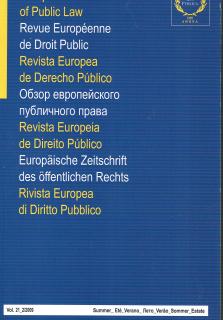
The Contribution of New Technologies
in Achieving Transparency and Efficiency
in Public Administration
Institutional and Operational Consequences
PhD (Paris I), Attorney-at-Law, Lecturer at the Ionian University
Good governance is a prerequisite for the economic development of a country, for fighting poverty and unemployment and promoting democracy. The need for good governance has been recognized on a national and a global level. Corruption and maladministration undermine both economic development and good governance. In two sections we firstly present how ICTs (Information and Communication Technologies) can contribute towards promoting transparency and efficiency of Public Administration and secondly how they can contribute towards restructuring Public Administration. The real structural reform of Public Administration cannot be achieved solely through the implementation of ICTs for the support of existing structures or the simple computerization of fixed procedures. A coordinated and organized effort is required, allowing the State to proceed with an overall redesign of its organizational structure, its procedures as well as the necessary institutional framework that regulates them, in a way that fully and efficiently utilizes the capabilities offered by new technologies and promotes communication between the Administration and the citizen.





















